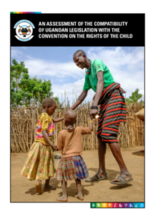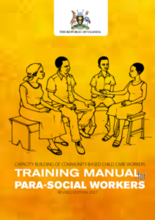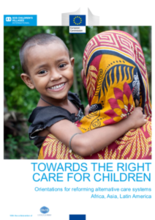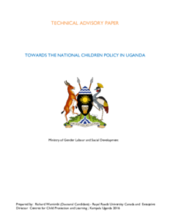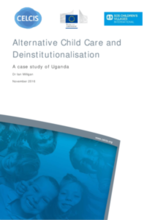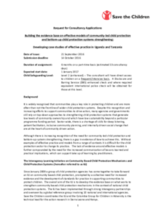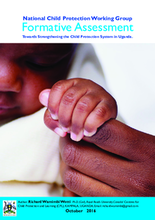This country page features an interactive, icon-based data dashboard providing a national-level overview of the status of children’s care and care reform efforts (a “Country Care Snapshot”), along with a list of resources and organizations in the country.
demographic_data
childrens_living_arrangement
children_living_without_bio
social_work_force
key_stakeholders
Key Stakeholders
Add New DataOther Relevant Reforms
Add New Datadrivers_of_institutionalisation
Drivers of Institutionaliziation
Add New Datakey_research_and_information
Key Data Sources
Add New DataThe Children Act (Uganda)
Country Care Review: Uganda
Prevalence and number of children living in institutional care: global, regional, and country estimates
The National Integrated Early Childhood Development Policy Action Plan (2016-2021) of Uganda
Catholic Care for Children in Uganda: A Family for Every Child - Findings from a Midterm Evaluation
Acknowledgements
Data for this country care snapshot was contributed by a consultant with the Data for Impact (D4I) Project at Palladium Group LLC.
Displaying 241 - 250 of 418
The purpose of the assessment was two-fold: To identify legislative provisions that are incompatible with international standards, as well as the gaps where the legislation fails to recognise or does not adequately recognise or protect international human rights standards.
This manual is intended to train Para-social workers who are a non-formal “workforce” that constitute the largest but yet undefined group of caregivers who provide support and services to vulnerable children and families, particularly in low and middle income countries (GSSA, 2016).
The general objective of this study was to conduct a research on the possible issue of institutionalisation in six South and Central American, Asian and African countries in order to strengthen the knowledge of the European Commission on the nature, the extent and scope of institutionalisation and feasibility of de-institutionalisation (alternative care for children).
This technical advisory paper is prepared for the Ministry of Gender, Labour and Social Development to guide the scope of the National Children Policy expected to replace the existing National Policy on Orphans and Other Vulnerable Children in Uganda which has been in existence for past 12 years.
CRS seeks a Project Director to work with 4Children Uganda in its Kampala location.
The story of two girls who fled South Sudan and joined thousands of unaccompanied minors living in Uganda's refugee camps.
The last Thursday of every month, children at S.A.L.V.E. International will be debating inequality live: 2 to 4 p.m. in Uganda; 11 a.m. to 1:00 p.m., in the U.K.
This report is a case study on alternative care arrangements and deinstitutionalisation in Uganda.
Building the evidence base on effective models of community-led child protection and bottom-up child protection systems strengthening – developing case studies of effective practice in Uganda and Tanzania
The Child Protection Working Group (CPWG) commissioned this assessment to assess the effectiveness of the CPWG, structural setup and work methods from 2012 to date in contributing to child protection systems strengthening in Uganda.

